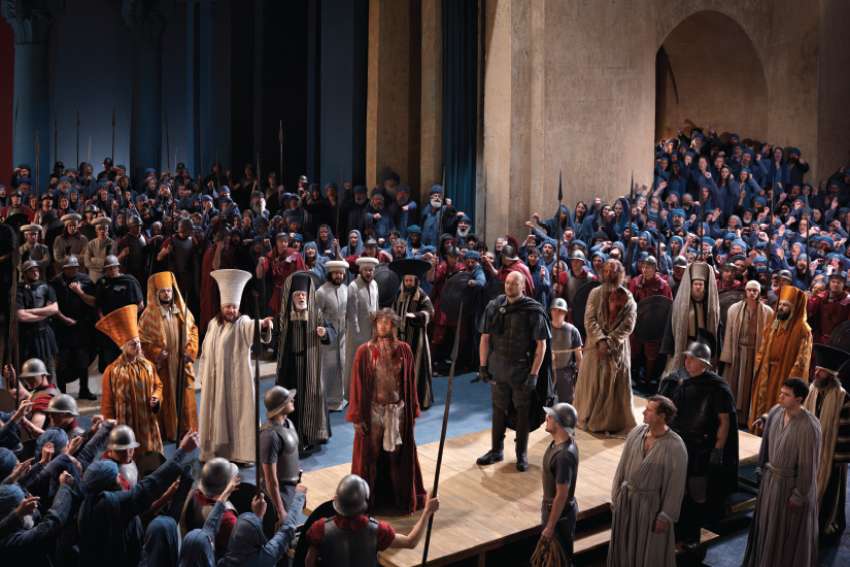So unique, in fact, that thousands around the globe, including Canada, make the trek to Oberammergau for this production of the story of Jesus’ final days and His resurrection. And it only happens every 10 years.
To peel back all the layers that make this particular play special, you have to go back to 1633, when the Black Plague swept through the region.
“There was no modern medicine, people did not understand what was happening,” said Frederik Mayet, a resident of Oberammergau who played the role of Jesus in the town’s 2010 production. “People started dying, they thought it was a punishment from God so they prayed. The people of Oberammergau promised to perform a Passion Play dedicated to the life and ministry of Jesus if He spared the town. He did and we have kept our promise ever since.”
The next version of the play is due in 2020, which will be its 42nd production since first hitting the stage nearly 400 years ago. Mayet and Christian Stueckl, director of the play since 1990, were in Toronto this month as part of a North American tour to promote the town and the play.
This Passion Play is made up of 16 acts, beginning with a tableau of Adam and Eve, followed by other notable stories like Jesus and the Money Changers, The Last Supper and ending with the Resurrection and Apotheosis. It is not your traditional Passion Play— the entire performance is five to seven hours long, performed in German, and includes a meal break between acts. It is performed five times a week from April to October in a 4,700-seat theatre which has undergone several changes over the centuries. Except for the odd exception, including two world wars, the every-10-years rule still applies.
To make it a truly made-in-Germany experience, the actors are not Julliard graduates or Broadway transplants — they are people born or raised in Oberammergau.
“Over the years many aspects of the play have changed, but that one rule remains,” said Stueckl. “You have to be born in Oberammergau or have lived here for 20 years to take part.”
In 2010, there were about 2,000 citizens involved in the production, from actors to stage hands to orchestra to chorus to costume makers.
Stueckl’s family owned a restaurant and hotel in town. Growing up, he would see the actors come in for dinner and would overhear their conversations about the play. His ancestors were there when the first Passion Play was performed.
“You can actually find our name in the church’s record books,” he said, laughing.
Growing up in Oberammergau, Stueckl’s peers dreamed of playing Jesus or Mary Magdalene. He wanted to direct, a dream that was almost made impossible by old rules.
“Since I was 15, I knew I wanted to be the director. When I first approached them, they were hesitant because my wife is Protestant. The old rules stated only Catholics could perform.”
Like the rest of Germany, Oberammergau is becoming increasingly culturally diverse. Although 90 per cent of the population is still Catholic, they now have actors and producers of all ethnic backgrounds and religions working on the Passion Play, a change Stueckl advocated for when he became the director.
Stueckl also struck down the rules stating only women who were unmarried and under the age of 30 could perform. He also eliminated controversial content that was seen as anti-Semitic by Jewish communities.
“I noticed that nothing had changed in 80 years,” said Stueckl. “The costumes were the same and the script had some anti-Semitic content. The costumes were offensive as was the dialogue. It portrayed Jewish people in a very negative light.”
Stueckl’s grandfather lived in Oberammergau while the Nazis were in power. He told him Adolf Hitler was a big fan of the play. “He (Hitler) loved it apparently,” said Stueckl. “Once I heard that, I knew how important it was to change those parts of the play, especially given our history.”
This was during the 1970s. The young people of Oberammergau were emigrating to larger cities like nearby Munich. If they wanted to keep the play alive, Stueckl knew the key was enticing young people to stay.
“The young people of my generation really stood up and made some changes. It must have worked because (travel agent) Thomas Cook brought the first tourists shortly after.”
For a town of 5,000 people, the Passion Play is a driving force of their economy. The town sees approximately 500,000 visitors during the run of the play.
“We see a lot of Canadians,” said Mayet, adding that the schedule for the promotional tour he and Stueckl are on has been jam-packed. “We were just in New York, before that it was San Francisco. We’re both very jet lagged.”
“The first time he (Mayet) stopped in Toronto it was for 24 hours,” said Brett Walker, general manager for Collette, one of many travel companies that organize tours to Oberammergau. “We managed to get to squeeze in all our interviews, press conferences and a visit to the CN Tower with time to spare. I wanted to ask him if he wanted to go for a beer but I kept thinking, ‘Is that okay? Can I ask Jesus to go for a beer?’ Eventually I did. He said ‘I thought you would never ask!’ ”
The announcement of roles for the 2020 production will not happen until the fall of 2019, but Mayet is one of the top picks to play Jesus again.
“It is a real honour,” said Mayet, who was 29 when he portrayed Jesus in 2010. “This is an important tradition. Our town invests in acting and music lessons for the young people to encourage participation and keep this tradition alive.”


